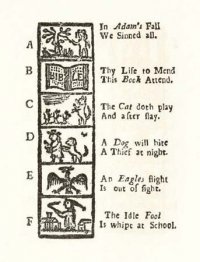 I talked about what is often called the first American public school law, the Massachusetts School Act of 1647 (often known as the “Old Deluder” law) and its colonialist setting. The Act required towns to use tax revenue to set up school buildings to ensure that children were catechized and taught to read, since it is “the chief project of that old deluder, Satan, to keep men from the knowledge of the Scriptures.” While most historians of education have focused on the explicitly “religious” nature of the law (because it mentions Satan), I argued that the document is more interesting as a colonialist text, written and enacted in an environment where the devil and demonic were frequently associated with “wilderness, ” “ignorance, ” and the “barbaric” Others of settler colonialism.
I talked about what is often called the first American public school law, the Massachusetts School Act of 1647 (often known as the “Old Deluder” law) and its colonialist setting. The Act required towns to use tax revenue to set up school buildings to ensure that children were catechized and taught to read, since it is “the chief project of that old deluder, Satan, to keep men from the knowledge of the Scriptures.” While most historians of education have focused on the explicitly “religious” nature of the law (because it mentions Satan), I argued that the document is more interesting as a colonialist text, written and enacted in an environment where the devil and demonic were frequently associated with “wilderness, ” “ignorance, ” and the “barbaric” Others of settler colonialism.
Our papers, though wide-ranging in their chronology and scope, shared a number of themes. As Sarah Barringer Gordon noted in her response, every paper focused in some way on education as a project of combatting enemies. One way to write histories of (religion and) education is to identify who these enemies are, and how educators have used schools as sites for these battles. Gordon also noted the ways that studying religion and education allows for rich histories of public/private distinctions. Public education, in many cases, has been imagined as necessary because of private failures. The 1647 act, for instance, was enacted because a 1642 act requiring parents and masters to educate and catechize their own households was neither followed nor enforced. In the twentieth-century New York schools, efforts to instill the ethic of “love thy neighbor” gained traction because of narratives of decline that lamented students’ apparent lack of such moral education at home. In both instances, instruction was designed as a corrective to the deficiencies of (often racially coded) private, unregulated spaces.
Although there is not (yet) really an identifiable group of historians or historically oriented scholarship on religion and American education, especially within the context of American religious history, scholars have touched on these topics before. The angle probably most often taken up by historians of American religion is to focus on the role of public schools in law, especially in the context of disestablishment. Steven Green has placed public schools at the center of the history of nineteenth-century church-state separation. Tracy Fessenden’s Culture and Redemption (2007) discusses anti-Catholicism in educational materials such as the New England Primer and as manifest in conflicts in the common schools. (Some of this was first published in her 2005 Church History article on the Bible Wars.) Many other historians have written about the “Bible Wars” as well, in the context of nativism, anti-Catholicism, and church-state separation. In the twentieth century, Supreme Court cases, including McCollum v. Board of Education (1948), Engel v. Vitale (1962), and Abington v. Schempp (1963), have provided data for disestablishment-centered narratives of religion and education. Indiana University recently held a conference—in which some of the participants of the ASCH panel participated—on the fifty-year legacies of the Schempp decision. Education often plays a prominent role in histories of the culture wars, including much of the forthcoming work in that area.




